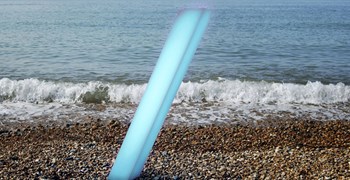"He knew how much was riding on this": Winston Churchill's "finest hour" speech among a million documents in archive of former Prime Minister
This article originally appeared on Culture24.
Letters to Stalin, Gandhi and HG Wells among million-document Churchill archive
 The final page of Churchill's celebrated finest hour speech, delivered in parliament and then broadcast on June 18 1940© Sir Winston Churchill Archive Trust / Estate of Winston S Churchill, courtesy Curtis Brown, London
The final page of Churchill's celebrated finest hour speech, delivered in parliament and then broadcast on June 18 1940© Sir Winston Churchill Archive Trust / Estate of Winston S Churchill, courtesy Curtis Brown, LondonCurators at Cambridge University’s Churchill College say the bulk of the “priceless” collection reflects Churchill’s stand against Adolf Hitler and fascism. The papers, which range from an early letter to his mother to the speech which coined the term “iron curtain”, were passed to the college by his widow, Clementine, in 1969.
 The first page of Churchill's earliest surviving letter, written to his mother and postmarked January 4 1882. Churchill was seven years old© Sir Winston Churchill Archive Trust / Estate of Winston S Churchill, courtesy Curtis Brown, London
The first page of Churchill's earliest surviving letter, written to his mother and postmarked January 4 1882. Churchill was seven years old© Sir Winston Churchill Archive Trust / Estate of Winston S Churchill, courtesy Curtis Brown, London“The page is covered with his handwritten annotations in red and blue ink. It highlights how much care and attention Churchill put into this speech.
“He knew how much was riding on this. The country was facing a huge national crisis. France had capitulated and Britain was facing the prospect of attack and invasion.
 The seating plan from the Potsdam conference, dedicated to Churchill and signed by President Truman and Marshal Stalin (July 23 1945)© Sir Winston Churchill Archive Trust
The seating plan from the Potsdam conference, dedicated to Churchill and signed by President Truman and Marshal Stalin (July 23 1945)© Sir Winston Churchill Archive Trust“It gives him, I think, the rhythm – it enables that great Churchill oratory. Nowhere is that more evident in this speech than in the very final page, that great crescendo.”
More than a million documents make up the archive, which has now joined Magna Carta, the Bayeux Tapestry and Iran’s Persian epic poem, the Shahnameh, on UNESCO’s Memory of the World Register. Packwood calls the collection “unique and irreplaceable.”
 Churchill the war leader (circa 1945)© Sir Winston Churchill Archive Trust
Churchill the war leader (circa 1945)© Sir Winston Churchill Archive Trust“It includes his original annotated notes for his famous international broadcasts and correspondence with the great politicians, military leaders, authors, scientists and thinkers of his age.”
One of those leaders was Joseph Stalin, of the Soviet Union, who Churchill called for a summit with during the 1950s. Three US Presidents, the destructive power of the hydrogen bomb, British policy across the world, painter Walter Sickert and actor Laurence Olivier were also among those related to.
“It is a fantastic privilege and a very great pleasure to see the Sir Winston Churchill Archive inscribed at as part of the Memory of the World,” says Dr Alice Prochaska, the Chair of the overseeing Sir Winston Churchill Archive Trust.
“This amazing documentary resource brings benefit to scholars, schools and citizens. It is a legacy to future generations from one of the world’s greatest leaders and a source of endless fascination and inspiration for students and citizens in every nation.”
The papers were transferred to the centre from Oxford’s Bodleian Library more than 40 years ago.
Ten of Churchill's correspondents
- Franklin D Roosevelt US president between 1929 and 1932
- Harry S Truman Post-war US president
- Dwight D Eisenhower 34th US President and a key ally of Churchill, despite their disagreements
- Charles De Gaulle French leader for more than a decade from 1958
- Joseph Stalin Soviet Union leader for more than 30 years
- Mahatma Gandhi Leader of the independence movement in British-ruled India
- Jawaharlal Nehru The first Prime Minister of India, appointed in 1947
- HG Wells Prolific sci-fi writer and the man behind The War of the Worlds
- Walter Sickert English artist who depicted Churchill in 1927
- Laurence Olivier Revered actor who was knighted in 1947
What do you think? Leave a comment below.
Three places to follow in the footsteps of Churchill in
Churchill War Rooms, London
Visit Churchill War Rooms to discover the original Cabinet War Rooms, the wartime bunker that sheltered Churchill and his government during the Blitz. Explore the historic rooms to experience the secret history that lives on underground.
Blenheim Palace, Oxfordshire
Sir Winston Churchill was born in the Palace in 1874 and a permanent exhibition about him is located next to his birth room – both are included in the Palace tour. He is buried in a simple grave in the nearby church at Bladon. A separate exhibition, ‘Churchills' Destiny – the story of two great war leaders’, celebrates the achievements of Winston and his great hero and ancestor, John Churchill.
The Library and Museum of Freemasonry, London
Items belonging to famous and Royal Freemasons, including Churchill and Edward VII, are on display here, together with examples from the museum's extensive collection of prints and engravings, photographs and ephemera.












